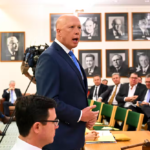What happened to our retirement?
Australians born after 1965 will have to work until they are 70 years old. Nicole Orr says we need a greater understanding of the secondary effects this will have on the individual, the economy and the communities of Australia.
With a new budget comes much angst and media repertoire; middle class welfare recipients are up in arms and the permanently unemployed are horrified. There are many new initiatives that are gaining negative press. Very little however seems to be discussed about the increasing of Australia’s retirement age to 70 years old, officially the highest in the world.
The fault is not solely with the Liberal government however. They seem to be placing a nail in the coffin that was previously constructed by the Labour government in 2010, when it was legislated at 67 years of age.
The question still remains, what has happened to our retirement? And, what positive effects will really come from the increase in retirement age by three years? Not one country in the world currently has a retirement age as high as 70 years old. The closest is currently Finland at 68, who as part of the European Union are tackling retirement in a gradual and flexible manner, accepting that their population is likely to transition to part time work as they move toward retirement, a trend they are encouraging.
The retirement age on its own does not have an adverse effect on individual’s lives or the community, provided the superannuation preservation age remains fixed. According to the government treasury web site however, the gap between the retirement and preservation age is large and will be closed over the next few years. Australians currently access their benefits at 60 years old if born after 1964. Given the indicators it looks likely to be increased to 70 as soon as the government can. To understand what this will mean for the population, it is important to look at the over 65 year old demographic.
It can’t be denied that with the incredible improvements in health care and medical breakthroughs our life expectancy has increased approximately 10 years since 1970. From the ABS, life expectancy for an individual born in 1991 is 75 years old if male and 80 years old if female. The increased longevity of Australians has recently been thrown around by the likes of Joe Hockey and even the Prime Minister to convince us that the increase in retirement age makes perfect sense. What is not mentioned is that the quality of life is increasing at a much slower rate than life expectancy is. As succinctly stated by the government’s own treasury web page, “while individuals might expect to spend at least a portion of their additional life expectancy in good health, due to advances in health technology, a significant portion may be spent with a disability”. Is it a true retirement if spent in poor health or disabled?
In 1995, 90% of people over 65 had experienced a recent illness and 99% reported at least one long-term health condition. The solution proposed to ‘force’ more elderly people to remain in the work force, seems unusually cruel and futile. This 65-70 year old demographic may be able to continue their employment but many will not; manual labour or even just physically active jobs, fast paced or high tempo tasks, as well as any jobs where employers cannot support an elderly person with a higher likelihood for sick leave for legitimate injuries and ailments.
I have a huge amount of respect for my elders and I am horrified that as an almost 70 year old, with a 50% chance of suffering arthritis is expected, nay required, to continue to work. Once the true quality of life increases to match the increase in life expectancy, then that should be the point where the retirement age is increased.
The truth is a majority of 65 year olds will not be able to work due to health reasons anyway. How difficult are we as a society planning on making it for them to access their superannuation early? The government can’t have its cake and eat it too, so is the plan to start paying people not yet at their preservation age a disability pension? Taking even more taxpayers money to support these individuals in the gap between their inability to work and their retirement age?
The logical solution is to let people retire earlier and have access to their superannuation, concluding that if individuals run out of money at the back end of their lives, it will be cheaper than supporting them when they have their own superannuation fund they could be using. The number of individuals running out of money at the back end will sadly be statistically less due to death than at the earlier age between ailing health and retirement. From the statistics, there will be such a small amount of people able and willing to work past 65 that the government has already wasted more than it will make in putting forward the legislation to increase the retirement age and then subsequently the preservation age.
Lastly the question must be asked, what is the average retired person doing with their day that can now be postponed for these extra years in order to achieve the ‘perceived’ economic stability that is proposed to be created by an increase in the retirement age? According to the ABS, in 1997 people over 65 years old spent approximately 30% of their waking hours on unpaid work, include caring for grandchildren, voluntary work, domestic duties etc. How will the likes of Red Cross or the Rotary Club survive when the people that make up their core unpaid workforce are required to remain in paid employment? It is unlikely that there is a government plan to start paying these voluntary groups in the future to keep the clubs, carers and other community organisations running. In the end we will be left with an even greater burden on our society, as the elderly retirees who are keeping the needier in our society alive, will no longer be able to do so. As a result it is likely that the government will find itself in a greater financial dilemma.
Following this line of thought to a conclusion, there will need to be jobs and salaries for the roles that we could have just left our retiree to do happily. I think that although there has been a great deal of discussion about the other components of the recently released Liberal budget, the increasing of the Australian retirement age to 70, well past every other country in the world, is one which should be made with more consideration. A greater understanding of the secondary effects that this will truly have on the individual, economy and more importantly on the community of Australia is required before it is put forward in parliament.
Nicole Orr was born in 1979 and raised in Darwin NT, she attended university at Australian Defence Force Academy in 1997 and studied bachelor of engineering -Civil and subsequently graduated from the Royal Military College – Duntroon. Nicole is an Engineering Officer in the Australian Defence Force and has served in several management and command roles. She lives in Sydney with her partner and is studying a Bachelor of Social Science – Psychology via Distance with Charles Sturt University.











